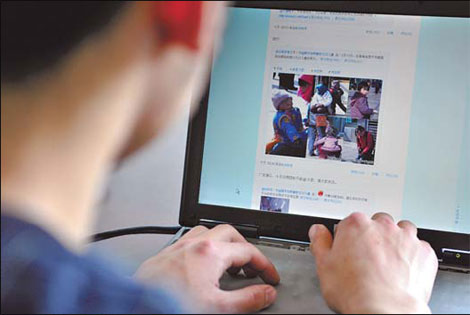Focus
Arm's-length blogs bring parents closer to their kids
Updated: 2011-04-04 11:56
By Zhou Wenting (China Daily)
|
A user surfs a Sina Weibo page in Taizhou, Zhejiang province. Zheng Ce / For China Daily |
BEIJING - Xu Hong, the mother of a 14-year-old girl in Shanghai, added her daughter to her contact list on weibo, the Chinese equivalent of Twitter, as soon as she knew her child had also registered an account in early February.
"I feel weibo is an excellent platform for my kid and me to communicate with each other, not only sharing the latest interesting topics, but also understanding a new side that is rarely revealed inside family," Xu said.
Xu is one of the many parents nationwide who have taken advantage of the fashionable tool to create extra communication with their children.
A recent online poll by Sina.com.cn and Beijing News found that more than half of the surveyed parents of elementary and middle school students said their children had tuned in to this latest craze sweeping the country.
They said one of the major reasons why they supported their children using weibo was that they could learn their children's situation quickly and enhance parent-child relations.
The survey was conducted from March 16 to 25 and got responses from more than 3,800 people.
Unlike the content of adults' micro blogs, children usually record school life and talk about explosive campus issues on theirs as well as blow off steam.
"Now, when we make new friends, we exchange weibo accounts," said Wang Jia, a girl in the fifth-grade at the capital's Huixinli Elementary School, who also said there are many younger users and even children as young as 6.
Xu, the mother in Shanghai, said weibo brought her and her child closer.
"Now, I discuss many thoughts, which are inconvenient for face-to-face communication, with my daughter through the micro blog and I can also learn her real feelings better," she said.
Xu's daughter, a second-grader in a middle school in Shanghai's Putuo district, is an active learner with a consistently outstanding academic performance. Xu didn't realize her daughter was depressed until she saw her micro blog, which included complaints about her heavy load of homework and extra courses.
The following weekend, Xu took her daughter to watch a movie and eat her favorite snacks and noticed that, as soon as they returned home, her daughter had updated her micro blog.
"It is really a pleasant day today. Thank you, mommy," she wrote.
Xu immediately replied: "The biggest wish of a mom is her child's happiness."
Experts on youth issues said effective and continuous parent-child relations is a very important communication outlet for children and weibo and tools like it can help.
"Weibo not only connects a parent and a child but also their social circles, as well as the people and matters they care about, which will give a more profound and wider understanding for each other," said Zhang Wenjuan, deputy director of Beijing children's legal aid and research center.
However, out of concerns that children could be exposed to unhealthy topics, some parents have started to "spy on" their kids via weibo.
A parent in Beijing surnamed He who said he was not a micro blog enthusiast now logs on his weibo account every day, just to check on what his son has shared.
"The network is open, so I am concerned that my child, who is at a significant phase of physical and mental development, will be polluted by bad topics," said He, whose son is a fifth-grader at the capital's Huixinli Elementary School.
The opinion is shared by many of those who responded to the survey, with more than half saying negative content on the platform is harmful to children and more than 80 percent supporting the idea that children should use weibo only with parental guidance.
However, experts said microblogs will not increase the chance of a child getting access to dangerous information. Instead, it creates a transparent platform to reveal what the kids are talking about.
"When the country is more diversified from its conservative past, children are vulnerable to much unhealthy information from various sources, such as the Internet, or just the more open social atmosphere. However, children often add only their peers to their contact list on weibo, which might be more simple than the Internet environment," Zhang Wenjuan said.
Even if parents see kids share improper information on weibo, Zhang said it is a great opportunity to help the children change the way they view things and establish a positive value system.
"Children are the victims of the complicated social environment, especially those who are at a rebellious stage, usually above 12 years old," said Zhang.
"If they have trustworthy adults to help them and have smooth communications, they will not be influenced by people with ulterior motives. An effective parent-child communication will help children go through the rebellion phase safely."
China Daily
Specials

Fill dad's shoes
Daughter and son are beginning to take over the family business of making shoes.

Have you any wool?
The new stars of Chinese animation are edging out old childhood icons like Mickey Mouse and Hello Kitty.

Virtual memorial
High-Tech touches to traditional tombsweeping festival help environment
